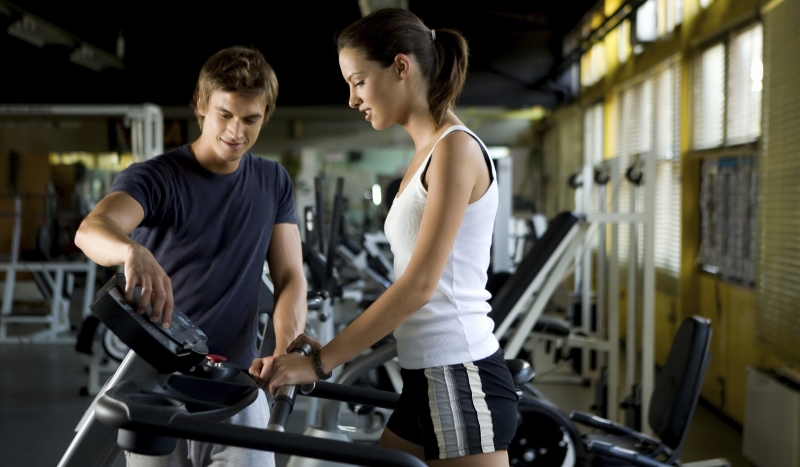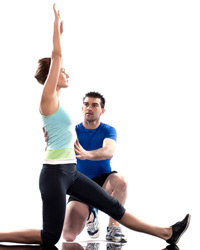What to look for in a Personal Trainer

Many of us have been assigned a personal trainer when we first joined a gym... Only to find out that they... just weren’t quite right.
 Finding the right personal trainer can be a challenge. While it’s crucial that any potential candidate is fully qualified, you need to be sure that you are going to enjoy spending time with them – hopefully on a regular basis.
Finding the right personal trainer can be a challenge. While it’s crucial that any potential candidate is fully qualified, you need to be sure that you are going to enjoy spending time with them – hopefully on a regular basis.
Developing a personal, yet professional relationship with your trainer is very important. Trust your instincts. Ask yourself if you think you could get along well with the trainer and whether you think the trainer is genuinely interested in helping you.
The Basics
Do not assume that because a personal trainer is working at a gym that they are certified. If you find that they are certified, that certification should come from a legit certification body. This is one of the most important aspects to know when learning what to look for in a personal trainer. Here are a few additional things to check when making your choice:
1) Are they qualified? Do they have a fitness instruction certificate and also a first aid certificate?
2) Are they registered with a professional or national body?
3) Are they insured?
4) What experience do they have? Ask for a reference or testimonial.
5) Can they schedule appointments that are convenient for you?
6) Most importantly - Do you like them? Is this someone that you are going to enjoy spending a few hours a week with?
Where to Start Looking
Most gyms and personal training centres will have personal trainers on site. Remember that you don’t need to accept the first trainer that you are assigned to. Don’t be afraid to have a coffee or catch up with a few before making your choice. Most large gyms will have a number of different trainers who would be more than happy to take you on.
If you are looking for a freelance trainer to come to your gym, office or home then sites like this one - “The National Register of Personal Trainers” is a great place to start. Once again don’t pick the first one you see. See how they portray themselves on the site, check qualifications, experience, fees etc. And try and arrange a no-obligation time to meet them. Many will offer a free initial consultation.
What to Expect at the First Meeting
Many personal trainers will offer a free initial consultation which may include a health and fitness assessment. This isn’t mandatory but can help avoid duplicating questions further down the line. It’s also the first opportunity for you to start ‘feeling them out”.
The trainer is likely to ask you to answer a range of questions about your health, lifestyle, current and past exercise habits or regimen and what you are hoping to acheive. (Be wary if they don't focus in on what you hope to get out of working with them).
They will also ask some medical questions, commonly from a PAR-Q form. This is important as it will alert the trainer to any special criteria or medical conditions that they will need to take into consideration when designing your training programme. In rare cases, if there are a number conditions or a particular problem, the trainer may ask you to have your doctor sign a form before they agree to take you on. Don’t be offended, this is actually a good sign that they are professional and are doing their job properly.
The Health Tests
After the paperwork the personal trainer may conduct a series of health and fitness tests. These will vary but commonly include looking at resting heart rate and blood pressure to see whether you are at an increased risk of heart disease as well as give a baseline measurement to monitor cardiovascular improvements. Other tests may include peak flow, body measurements, weight and body composition.
N.B. The more thorough the initial testing the better the personal trainer is likely to be.
Depending on results of the above tests and that no serious issues have been highlighted, there are usually additional basic fitness tests.
Cardiovascular Fitness Tests
Cardiovascular fitness tests determine how efficiently your body's circulatory and pulmonary systems are working.
There are multiple variations of cardio tests and they can range from walking, running, cycling or a step test.
- The Harvard step test takes the approach of assessing cardio fitness by checking your recovery rate. Quite simply, the fitter you are, the more quickly your cardio system will return to normal after a bout of intense exercise. The Harvard step test uses this to assess your overall fitness level.
- The Balke Treadmill test is an effective way to measure your VO2 max. VO2 max is considered the best measure of cardio endurance but probably not someting you will have to go through in an initial assessment.
It’s likely that your personal trainer will repeat these tests at regular intervals once you begin your exercise programme.
Muscular Fitness Tests
Resistance training improves your overall strength, bone density, body composition and raises your metabolism. Testing muscular fitness will give your trainer information to design an effective resistance training program. Some common tests include a pushup test, abdominal curl-up test, isometric bicep curl, isometric grip strength test or pull-up test. Your trainer might recommend only one or multiple tests in order to see a clear picture of your muscular fitness.
Flexibility and Range of Motion Tests
Flexibility is the capacity of a joint to move through a complete range of motion. The personal trainer is likely to run you through a battery of different tests looking at various parts of the body.
Trunk and Lower Body
- Sit and Reach Test
- V-Sit test
- Groin Flexibility
- calf muscle flexibility test
- 90/90 (AKE) hamstring test
- Straight Leg Raise
- Modified Thomas Test
Upper Body
- Shoulder Flex Test
- Shoulder Circumduction
- Shoulder Rotation: Acuflex III
- Back Scratch Test
- Shoulder Flexibility Test
- Shoulder Stretch
N.B. the sign of a good trainer is that they will ask you to warm up thoroughly before administering any tests.
Don’t look at any of these tests as a hardship or pass/fail scenario. The more accurately the personal trainer can gauge your current fitness levels, the better that they will be able to design a programme that will help you achieve your goals - and most importantly one that you will both enjoy and stick with.




